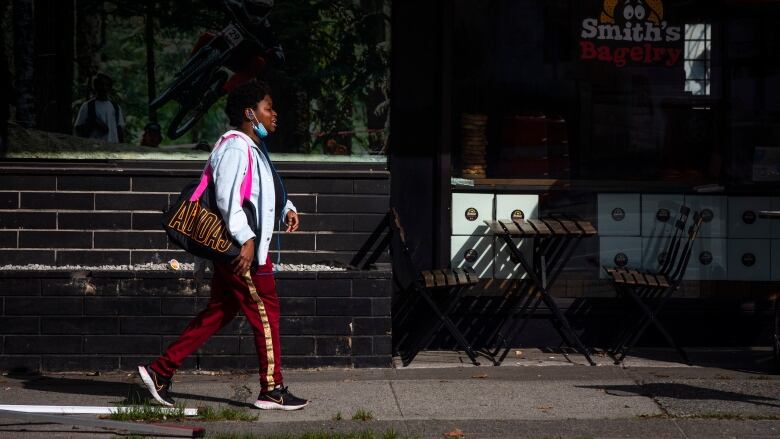26 more people die of COVID-19 in B.C., as 1,846 new cases confirmed over 3 days
There are 360 people in hospital with the disease, 151 of whom are in intensive care

British Columbiaannounced 1,846new cases of COVID-19 and 26more deaths on Monday.
In a written statement, the province said there are currently 4,917active cases of people infected with the novel coronavirus in B.C.
A total of 360people are in hospital, with151in intensive care.
Overall hospitalizations, which typically lag behind spikes and dips in new cases, are upby three cases from a week ago, when 357people were in hospital with the disease and about 20 per cent from a month ago when 298 people were in hospital.
The number of patients in intensive care is down by two from 153a week ago and up by 11 per cent from a month ago when 135people were in the ICU.
The provincialdeath toll from COVID-19is now 2,081lives lost out of 198,278confirmed cases to date.
The regional breakdown of new cases is as follows:
- 737new cases in Fraser Health, which has 2,039total active cases.
- 406new cases in Northern Health, which has 880 total active cases.
- 322 new cases in Interior Health, which has 777 total active cases.
- 212 new cases in Vancouver Coastal Health, which has 642 total active cases.
- 169new cases in Island Health, which has 521 total active cases.
- There are nonew cases of people who normally reside outside of Canada, a group with 58 active cases.
There are a total of 18active outbreaks in assisted living and long-term care.There are also four outbreaks at acute care facilities at Mission Memorial Hospital, the University Hospital of Northern British Columbia, G.R. Baker Memorial Hospital in Quesneland Tofino General Hospital.
Four new outbreaks were declared over the weekend at long-term care facilities. The province has declaredthe outbreak at Joseph Creek Care Village over.
As of Monday, 89.2 per cent of those 12 and older in B.C. have received their first dose of aCOVID-19 vaccineand 83.4 per cent asecond dose.
From Oct. 8 to 14, people who were not fully vaccinated accounted for 61.8 per cent of cases and from Oct. 1,they accounted for 68.8 per cent of hospitalizations, according to the province.
So far, 8.06million doses of COVID-19 vaccine have been administered, including 3.8million second doses.
U.S. border reopening
The United States is set to reopen its borders tofully vaccinated travellers by air, land or passenger ferry starting Nov. 8.
Air travellers will need to show proof of vaccination upon arrival in the U.S. and must also show a pre-departure negative COVID-19 test taken within three days of boarding their flight.
Non-essential travellers crossing at a land border will be required to show proof of vaccination or attest to their vaccination status upon request by a border agent but unlike air travellerstheywill face no requirementto show a negative COVID-19 test.
By January, essential travellers crossing into the U.S. at a land border will also be required to be fully vaccinated.
B.C. regional restrictions
The Northern, Interior, and Fraser Health regions have restrictions in place above and beyond the rest of the province due to high rates of COVID-19 in communities within these health authorities.
In the northern part of the province,personal indoor and outdoorgatherings are restricted to fully vaccinated people only.Indoor restrictions are limited to a person'shousehold plus five people, and outdoor gatherings are capped at 25.
Worship services can only be held online, alcohol sales have been cut offearlier at night, and masks and safety plans are mandatory at organized events.
Some northern communities with higher vaccination rates are not under the same strict restrictions. Visit Northern Health's websiteto confirm your community's situation.
In the B.C. Interior, indoor gatherings are also limited to one household plus five, and outdoor gatherings are capped at 50. There are also limits on the number of students at school assemblies and vaccine requirements for organized sports spectators and participants. Review full details on Interior Health's website.
In the Fraser Health region, residents in Abbotsford, Agassiz, Chilliwack, Harrison Hot Springs, Hope and Mission are limited to indoor gatherings of one household plus fivevisitors, unless everyone is fully vaccinated.
Outdoor personal gatherings at private residences are limited to one household plus up to 10 visitors, who must remain outside if people are not fully vaccinated.
To learn more about restrictions in the eastern Fraser Valley, visitFraser Health's website.
On Vancouver Island, there are no specific regional restrictions in place but Indigenous leaders have closed access to First Nation communities in Ucluelet andAhousaht.
John Jack, board chair for the Alberni-Clayoquot Regional District and aHuuayaht First Nations councillor, told On The IslandMonday that COVID-19 is "acutely" impacting First Nations communities on the Island's west coast.
He said there are a number of people living in these communities who still need a second dose of the vaccine and that a way to facilitate this would be for employers to acknowledge the need for time off to make that happen.
"I think we do need to see some understanding," said Jack.
Starting Sept. 27, the BC Vaccine Card will be the only accepted form of proof of vaccination for people 12+ who live in BC. You will no longer be able to use the paper immunization record from your vaccine appointment. Get your BC Vaccine Card today: https://t.co/8FB2ZFGVCs pic.twitter.com/5jGQdDHpZ1
—@BCGovNewsWith files from Katie Simpson, Darren Major












_(720p).jpg)


 OFFICIAL HD MUSIC VIDEO.jpg)
.jpg)



























































































